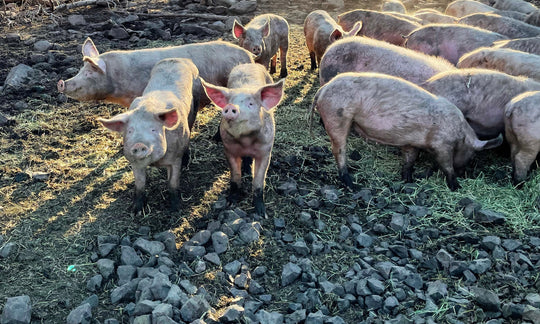Our Sourcing Philosophy

Our Sourcing Philosophy is built on four pillars that support our vision to better the world by redefining American Charcuterie.
Humane Care & Animal Husbandry
Pigs should live in as natural a habitat as we can create for them. They have a higher quality of life when they have space to roam, access to shade, shelter, sunlight, fresh air and a bounty of nutrients. They also hold less stress in the body! All these factors help play a role in producing tastier, more nutritious pork.
Studies have shown that animals raised in confinement heighten the risk of spreading food-borne illnesses. Crammed into tight confinement areas in massive numbers, factory farmed animals are a prime risk for developing diseases, which can spread to humans! This creates the need to use antibiotics, to combat the illnesses present in confined farming. Plus, animal waste is the primary source of infectious bacteria such as E. coli and Salmonella, which affect human populations through contaminated food and water. The CDC believes that contaminated meat and poultry infections affect 3 million people each year.
Today, pig farming practices found in most of America play major roles in the air and water quality of their surrounding communities. When hogs are raised in confinement, their waste ends up in a “manure lagoon.” When the lagoons get full, they are then emptied through a sprinkler system onto nearby fields, making an odor that is so strong it makes it impossible for the surrounding neighbors to go outside. If the lagoons are not drained, they will overflow and can enter into surrounding streams or other water sources, increasing pathogens. Confined farming produces hundreds of millions of untreated waste.
Pigs are also a grazing animal, and can help regenerate pastures by consuming weeds and fertilizing with natural manure. They are a part of the puzzle in helping curb carbon emissions by reducing soil erosion and creating harmony on a small pastured farm operation.
In large and industrial hog operations, antibiotics are used to promote faster growth in the animal while feeding less. The animals are pumped with antibiotics at a very young age - they can then develop deadly bacteria called MRSA, which is drug resistant. MRSA can easily be spread to humans simply by touching the animal and is contagious once one human contracts the bacteria. MRSA has been known to cause deadly skin, blood and lung infections.
Promoting safe and fair labor practices
Today the meat industry has been recognized as one of the most dangerous industries to work in throughout the United States. The industry is known for creating workplaces that not only deny worker rights, but basic human rights. Immigrant workers are an increasing percentage of the workforce within the meat packing industry and experience some of the worst effects of bad workplace practices. Language difficulties often prevent them from being aware of their rights under the law and of specific hazards in their work. If immigrant workers are undocumented, deportation is a huge risk if they seek to improve their working conditions.
